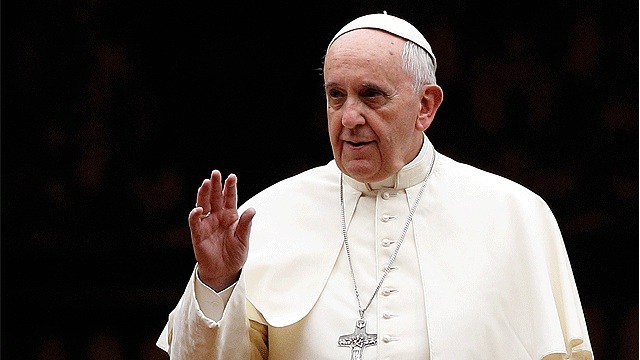
In an off-the-cuff talk on Saturday, Pope Francis compared the practice of aborting the disabled to Nazi ideology and reaffirmed that only the family founded on one man and one woman is the true image of God. Speaking to an Italian family association, the Pope said: “I’ve heard that it’s fashionable, or at least usual, that when in the first few months of pregnancy they do studies to see if the child is healthy or has something, the first proposal in such a case is, ‘Do we get rid of it?’”
This, he said, is “the murder of children…to get a peaceful life an innocent [person] is discarded”
Francis recalled that as a child he was horrified to hear stories from his teacher about children “thrown from the mountain” if they were born with malformations. “Today we do the same thing,” he said. “Last century, the whole world was scandalised by what the Nazis did to purify the race. Today, we do the same thing but with white gloves,” Francis said.
On the family, he noted that in modern society “one speaks of different types of family,” defining the term in different ways.
“Yes, it’s true that family is an analogous word, yes one can also say ‘the family of stars,’ ‘the family of trees,’ ‘the family of animals,’” he said, but stressed that “the family in the image of God is only one, that of man and woman…marriage is a wonderful sacrament.”
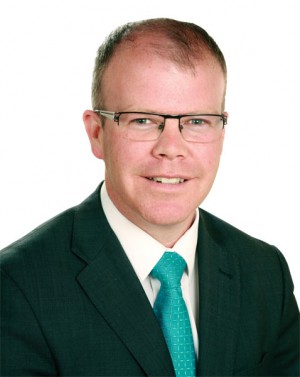
The Sinn Féin ardfheis has rejected a motion to allow its members a conscience vote on abortion, thereby imperiling the political futures of two of the bright stars of the pro-life movement.
Offaly TD, Carol Nolan, was the only TD in the Dáil to lose the party whip when she voted against holding the referendum to repeal the 8th Amendment. Peadar Tóibín, who was absent with permission from that vote, campaigned tirelessly to save the Eighth Amendment though he had to state the party’s official position in favour of repeal in every media appearance he made. He had previously lost the party whip in 2013 when he voted against the Fine Gael/Labour Abortion Act of that year. Both have indicated that they will also oppose the Government’s proposed legislation to make abortion available ‘on request’ up to 12 weeks, and on vague health grounds up to 24 weeks. The motion requesting that all “Sinn Féin members be allowed to articulate and vote on the issue of abortion in accordance with their conscience” was rejected by a majority of those present at the meeting which, unlike Fine Gael or Fianna Fáil, decides policy for the party.
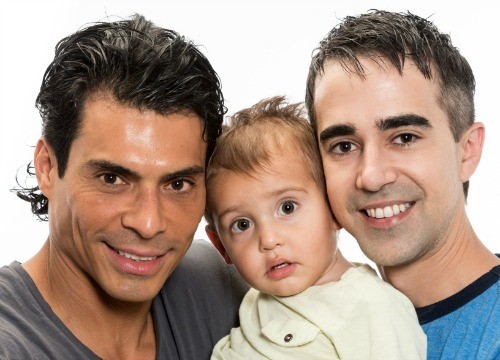
A lawsuit involving a surrogate mother, a couple, a reality TV show and a little girl has shone a revealing light on some of the most objectionable aspects of the fertility industry. The US Bravo network host a reality TV series called ‘Flipping out’ which features a real estate agent and his partner. The gay couple recently decided to have a child and duly contracted the fertility industry to make their wish a reality. They bought an egg from a woman out of a catalogue, inseminated it with their own sperm, and had the resulting embryo gestated in the womb of another woman. They then filmed the birth, without the birth-mother’s permission. She is now suing them for gross invasion of privacy. Meanwhile, the little baby girl continues to feature on episodes of the TV show.
In a comment in the US Journal First Things, Brandon McGinley, said that whatever happens with the lawsuit, the little girl will always have been born on television, her childhood will always have been a marketable commodity and she “will always be the product of the will and the checkbook of two men who wanted a bespoke parenting experience.”
He continued: “Her name is Monroe Christine. She is a little girl who was paid for by two men. Her mother was picked out of a catalogue; the woman who gave birth to her was a contractually obligated guest star on a television show.”

Laws requiring Catholic priests to break the seal of confession passed the Canberra Territory’s legislature in Australia on June 7. The purpose of the Bill was to expand mandatory reporting of allegations of child abuse and misconduct to include religious organizations. The Archdiocese of Canberra and Goulburn has nine months to negotiate with the government on how it will work before the start of reportable conduct requirements.
Writing in The Canberra Times, Archbishop Christopher Prowse of Canberra and Goulburn said he supported the revised scheme, but would not support a requirement to break the Seal of Confession. He said such a requirement would neither help prevent abuse nor efforts to improve the safety of children in Catholic organisations.
In April, New South Wales Premier Gladys Berejiklian called for the Seal of Confession to be addressed by the Council of Australian Governments rather than state governments in isolation. “Our response to that recommendation (of the Royal Commission) is to take it through the COAG process. We believe that is the best way to deal with it,” she told the Australian Broadcasting Corp. “They’re complex issues that need to be balanced with what people believe to be religious freedoms,” the premier said.

Sex education should begin at three years old, according to an academic speaking before an Oireachtas committee on Tuesday. The Oireachtas education committee is reviewing how relationships and sexuality education (RSE) is taught in schools and will publish a report recommending how the curriculum can be changed. The wishes of parents have been given little attention in the hearings so far.
Dr Aoife Neary, of the University of Limerick, told the committee that sex education should begin at three when language around consent such as “I don’t like that” should be introduced. At this age, children should be told about family diversity and introduced to the concept of same-sex parents, she said. Dr Neary said that sex education should not be delayed because of concerns about “age appropriateness”.
Sarah Haslam, of the national youth development organisation Foróige, said sex education would not take away a child’s innocence. She said it had a sex education programme that could be adapted by schools while an RSE curriculum was being created.
Niall Behan, head of the Irish Family Planning Association (IFPA), said the current RSE curriculum exposed women to the risk of sexually transmitted infections and unplanned pregnancies, while Ms Neary said the curriculum was silent on gay and transsexual health and this needed to be addressed.
Jane Donnelly of Atheist Ireland told the committee the abortion referendum “changes everything” as it shows politicians “can no longer assume” that the majority of Catholic parents “want Catholic sex education for their children.”

Research in the US has shown that 63 percent of fathers who lived at home with a child ages 0 to 18 reported eating dinner with their child every day; an additional 27 percent reported doing the same at least several times a week. Only 8 percent of these fathers reported sharing dinner about once a week, less than once a week, or never. By contrast, for non-resident fathers a mere 4% ate dinner with their child every day; 29% did so several times a week; and 17% did so once a week, whereas 49% did so less than once a week or never.
The researchers with the think-tank Child Trends said that positive involvement from fathers is linked to many benefits for children, including better self-esteem, lower levels of depression, and greater academic success. “This involvement can include a range of behaviors. Eating meals together (most often dinner) provides a time and place for fathers (and indeed, all parents) to practice these positive parenting behaviors—and eating together is itself linked to a range of benefits for children”, said the authors of the research.

The head of the main representative body of GPs has asked that the Government respect doctors’ consciences and allow both objection to abortion and to referral. Writing in the journal.ie, Dr Maitiu O Tuathail, GP and President of the National Association of General Practitioners (NAGP), said he was a pro-choice doctor who voted for Repeal said he believed that no member of society, whether a doctor or not, should be forced to do anything they do not want to do. “To threaten them with jail on the grounds of conscientious objection is wrong on many levels.” He recommended that legislation copy the conscience provisions of a New Zealand Act that fully protects the rights of all health care professionals who refuse to administer or refer for abortions.
He was writing on foot of a survey of GPs which found that most GPs in the country have a conscientious objection to abortion, and a mere 11% of the 880 GPs who were polled said they are prepared to provide abortion services.
Meanwhile, Irish Times columnist Newton Emerson has said conscientious objection to abortion should be entirely prohibited. He said conscientious objection meant “withholding a lawful treatment on personal religious grounds” and he called it “an extraordinary act of discrimination”. Even the fact of GPs being allowed operate an “opt-in” system for abortion “sends an unmistakable signal of continued shame and marginalisation”, to women. He recommended instead the example of Sweden, Finland and Iceland who no longer permit conscientious objection at all.

The Catholic Church’s support service for women facing unwanted pregnancies, Cura, is to close down tomorrow. Cura has attributed the decision to a declining demand for its services and to the Republic’s new regulatory environment for counselling which includes referral to pro-choice agencies. In addition, the State has drastically cut funding to Cura.
When originally established in 1977, Cura was one of two Irish agencies supporting women facing crisis pregnancies whereas now there are 14 such agencies, all of whom operate in a new regulatory environment with changing counselling quality standards compliance requirements. “In this new and changed environment we have been experiencing decreasing service demands in line with national trends and we feel this decision, which has been considered carefully for a number of years, is now the correct one”, they said in a statement.
They added: “The decision to close Cura is also informed by the findings and recommendations of the Health Service Executive Sexual Health and Crisis Pregnancy Programme (HSE SHCPP) Review of Funding and Service Delivery Models of Crisis Pregnancy Counselling Services, November 2017 undertaken by Mazar’s and further reinforced by Minister Simon Harris’s recent announcement of the decision to regulate the professions of counselling and psychotherapy”.
The Catholic Bishops praised the pro-life contribution of Cura staff, volunteers and clients over its 41 years of operation and said they “shared the regret of Cura’s national executive council that Cura has been compelled to close due to the decrease in demand for its services and the accreditation requirements associated with the new regulatory environment for counselling.”
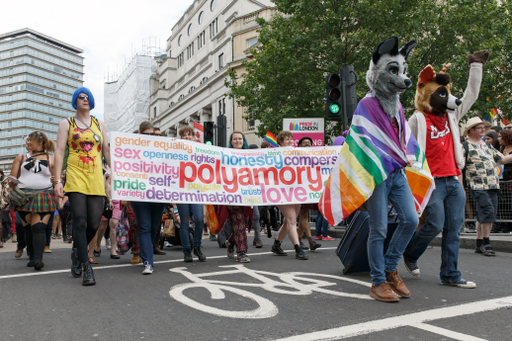
In a first of its kind, all three adult members of a polyamorous ‘thruple’ have been recognized as parents of a child in a court in Canada. The case involved a ‘stable’, three-way relationship between two men and one woman, none of whom are married. A child was conceived in the course of the relationship and, the court heard, while the identity of the mother is clear, the biological father of the child is unknown. Justice Robert Fowler of the Newfoundland and Labrador Supreme Court (Family Division) in the case of Re C.C., decided all three adults would be named as parents of the child born within their three-way relationship.
In his ruling, the Judge said: “the child, A., has been born into what is believed to be a stable and loving family relationship which, although outside the traditional family model, provides a safe and nurturing environment…. I can find nothing to disparage that relationship from the best interests of the child’s point of view…. To deny this child the dual paternal parentage would not be in his best interests. It must be remembered that this is about the best interests of the child and not the best interest of the parents.”
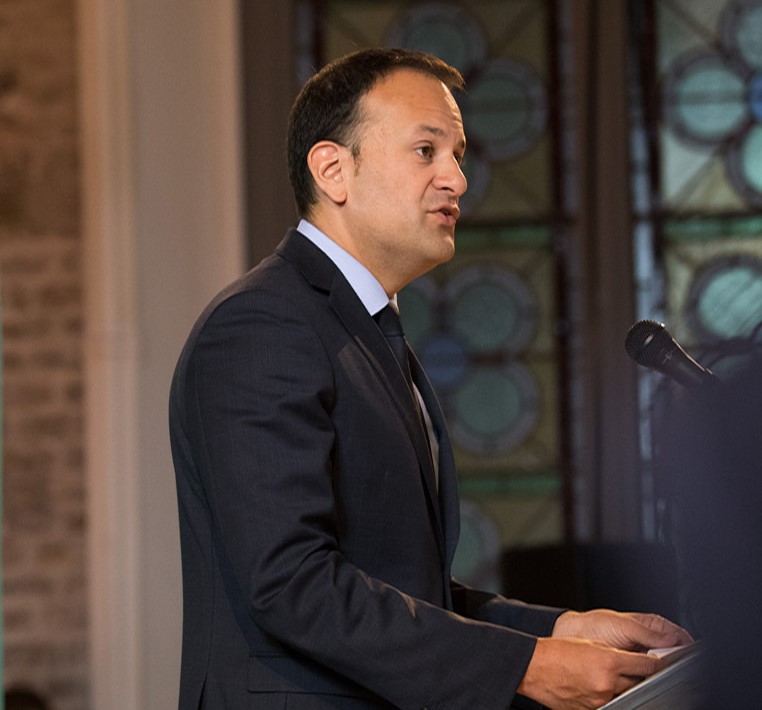
Catholic hospitals will have to provide abortion services said the Taoiseach in the Dáil yesterday. In reply to a question from Socialist TD, Mick Barry, Leo Varadkar said the proposed abortion legislation will allow individuals to opt out based on their consciences or religious convictions but will not allow institutions to do so. This means that “hospitals such as Holles Street, which has a Catholic voluntary ethos, the Mater, St. Vincent’s and others will be required and expected to carry out any procedure that is legal in the State.”
He added: “As I indicated when it comes to the abortion legislation, just as is the case with the Protection of Life in Pregnancy Act, the conscientious objection will apply to individuals; it will not apply to institutions. Under that legislation, enacted by this Dáil in 2013, voluntary hospitals that have a Catholic ethos are required to provide the service if it is necessary.”
In 2013, both St Vincent’s and the Mater said they would perform abortions on the suicide ground under the terms of the Protection of Human Life During Pregnancy Act.